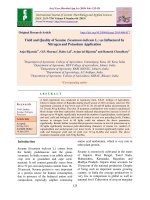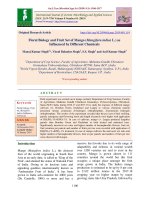Study of nitrogen release potential of Entisol and Vertisol as influenced by various sources of nitrogenous fertilizers
Bạn đang xem bản rút gọn của tài liệu. Xem và tải ngay bản đầy đủ của tài liệu tại đây (239.67 KB, 6 trang )
Int.J.Curr.Microbiol.App.Sci (2019) 8(1): 2950-2955
International Journal of Current Microbiology and Applied Sciences
ISSN: 2319-7706 Volume 8 Number 01 (2019)
Journal homepage:
Original Research Article
/>
Study of Nitrogen Release Potential of Entisol and Vertisol as Influenced by
Various Sources of Nitrogenous Fertilizers
N.B. More, S.S. Sadafule*, V.R. Gaikwad, B.D. Tamboli and G.D. Patil
Division of Soil Science and Agriculture Chemistry, College of Agriculture, Pune,
Maharashtra, India
*Corresponding author
ABSTRACT
Keywords
Nitrogen release
potential, Entisol,
Vertisol,
Nitrogenous
fertilizers
Article Info
Accepted:
20 December 2018
Available Online:
10 January 2019
The experiment was conducted to study the nitrogen release potential of Entisol
and Vertisolas influenced by the treatments of neem coated urea (NCU), DAP,
NPK briquette, NP briquette, urea briquette and crotonylidene diurea (CDU). The
application of all the sources of nitrogenous fertilizers increased the N release
potential by 336.78 % to 411.49 % over the control in Entisol and by 342.59 % to
470.98 % over the control in Vertisol. The application of NCU in Entisol(7.16 mg
kg-1 day-1) and the application of NPK briquette in Vertisol (7.63 mg kg-1 day-1)
showed the highest N release potential. The NPK briquette and NP briquette are
identified as the best slow nitrogen releasing fertilizers followed by the neem
coated urea and urea briquette.
Introduction
The improved understanding of N
mineralization and N immobilization, along
with their continuous changing dynamics may
improve our ability to manage N cycling and
increase nitrogen use efficiency (NUE) by
minimizing N losses whatever the form
(Cabrera et al., 2005). The use of slow N
releasing fertilizers having higher nitrogen
release potential is new development in this
direction of improving NUE of fertilizers. To
minimize nutrient losses and increase the use
efficiency of N fertilizer, the placement of
fertilizer or spot application of fertilizer, use
of slow release fertilizer and nitrification
inhibitors are recommended. The use of urea
super granules, urea briquette and urea DAP
briquette are another development in this
direction (Daftardar and Savant, 1995).
Placement of NPK briquette at 10 cm deep
maintained higher level of NH4+-N and NO3-N in soil (More, 1999). However, the
information
regarding
a
comparative
performance of neem coated urea, DAP, NPK
briquette, NP briquette, urea briquette and
crotonylidene diurea with respect to nitrogen
release pattern and availability of NH4+-N and
NO3--N from these sources is limited.
Therefore, the present study was undertaken
2950
Int.J.Curr.Microbiol.App.Sci (2019) 8(1): 2950-2955
to study the nitrogen release potential of
Entisol and Vertisol as affected by these
various sources of nitrogenous fertilizers.
determining the moisture content for further
calculations.
Results and Discussion
Materials and Methods
Nitrogen release potential of Entisol
The present laboratory experiment was
conducted at Division of Soil Science and
Agricultural
Chemistry,
College
of
Agriculture, Pune, Maharashtra during 201718 to study the release pattern of nitrogen in
Entisol and Vertisol due to effect of various
inorganic nitrogenous fertilizers at field
capacity moisture regime (0.33 bar).The
various physico-chemical properties of soils
are analyzed by using various standard
methods, the soil properties are given in given
in table 1.
There were fourteen treatments in experiment
viz. combination of six nitrogenous fertilizers
viz. F1-neem coated urea (NCU), F2-DAP, F3NPK briquette, F4-NP briquette, F5-urea
briquette and F6-Crotonylidene diurea (CDU)
and F0-control with two soils viz. Entisol(S1)
and Vertisol(S2). For maintaining moisture at
field capacity level, double distilled water was
used throughout the experiment. The amount
of N fertilizers to be added is calculated on
the basis of recommended dose of rice crop
i.e. 100 kg N per hectare. As 1 ha of soil
weight is 2.24×106 kg so further calculations
were made to determine the quantity of N
fertilizers for 1 kg of soil and 200 mg of N
was added per kg of soil (Table 2).
Incubation study for 0, 15, 30, 45, 60, 75 and
90 days of incubation (DOI) after addition of
nitrogenous fertilizers into soils was carried
out at ambient condition. The NH4+-N and
NO3--N in Entisol and Vertisol are evaluated
by method described by Kenney and Nelson
(1982). It is determined immediately after
sampling at each interval day by taking 5 gm
of soil from each incubated bowl. At the same
time same weight of soil sample was kept for
Among the different nitrogenous fertilizers,
the highest amount of cumulative NH4+-N
(153.03mg kg-1) found in DAP whereas the
highest amount of NO3—N (596.59mg kg-1)
found in NPK briquette fertilizer (Table 3). In
case of N release potential, thehighest
nitrogen release rate was observed in case of
fertilizer F1 (NCU) @ 7.16 mg kg-1 day-1
followed by fertilizer F3 (NPK briquette) @
6.98 mg kg-1 day and fertilizer F4 @ 6.94 mg
kg-1day-1 in Entisol. Similarly Suganya et al.,
(2009) observed that the lowest nitrate
nitrogen content was under NCU products
which show the higher N release potential
with respect to time. Thus, use of neem
coated urea products prolonged the nitrogen
availability for the crop growth thereby
minimized the losses of nitrogen and
improved the nitrogen use efficiency.
The lowest nitrogen release rate found to be
in control fertilizer @ 1.74 mg kg-1 day-1.It is
observed that nitrogen release potential was
highest in all fertilizer soils than control.
Further it was also found that at the end of
incubation period NO3--N was at higher levels
than NH4+-N in all treatments which might be
due to activities of nitrifying microbes which
oxidize the NH4+-N to NO3--N. Similar results
were observed by Singh (2017) while
studying mineralization kinetics of organic
manures (Table 4 and 5).
During study the application of all the sources
of nitrogenous fertilizers increased the N
release potential by 336.78 % to 411.49 %
over the control.The nitrogen release potential
in Entisolwas in order; NCU >NPK briquette
>NP briquette >DAP >UB >CDU >Control.
2951
Int.J.Curr.Microbiol.App.Sci (2019) 8(1): 2950-2955
Nitrogen release potential of Vertisol
Among the different nitrogenous fertilizers,
the highest amount of cumulative NH4+-N
(154.10mg kg-1) found in DAP whereas the
highest amount of NO3—N (643.83mg kg-1)
found in NPK briquette fertilizer.
The highest quantity of nitrogen release
potential was observed in NPK briquette @
7.63 mg kg-1 day-1followed by NP briquette
@ 7.57 mg kg-1 day-1 and Urea briquette @
7.31 mg kg-1 day throughout the incubation
study. As that of Entisol, the quantity of NO3-N found to be very high than that of NH4+-N
at the end of incubation study.
The order of nitrogen release potential was
found to be; NPK briquette >NP briquette
>UB >DAP >NCU >CDU >Control. Also in
Vertisol, CDU showed the lowest nitrogen
release potential as that of Entisol. From the
results, it is revealed that neem coated urea
(F1) in Entisol while NPK briquette (F3) in
Vertisol performed better nitrogen release
potential than other fertilizers in same soils.
This proves the superiority of briquette
fertilizers as reported by More and Shinde
(2001), Durgude et al., (2008) and Singh
(2012). The application of all the sources of
nitrogenous fertilizers increased the N release
potential by 342.59 per cent to 470.98 per
cent over the control in Vertisol (Table 6–8).
Table.1 Physico-chemical properties of Entisol and Vertisol
Sr. No.
A.
1.
2.
3.
4.
5.
6.
7.
B.
8.
9.
10.
11.
12.
13.
14.
15.
16.
17.
Soil properties
Physical properties
Sand (%)
Silt (%)
Clay (%)
Textural class
Bulk density (g cm-3)
Field capacity (%)
Permanent wilting point (%)
Chemical properties
pH (1:2.5; soil:water)
EC (dSm-1)
Organic carbon (%)
CaCO3 equivalent (%)
Available nitrogen (kg ha-1)
Available phosphorous (kg ha-1)
Available potassium (kg ha-1)
Ammonical nitrogen (mg kg-1)
Nitrate nitrogen (mg kg-1)
Exchangeable cations (meq. 100 g-1)
Ca2+
Mg2+
Na+
k+
2952
Entisol
Vertisol
52.50
31.75
15.75
Sandy loam
1.45
29.02
15.54
20.35
28.05
51.60
Clay
1.27
37.60
20.60
7.31
0.12
0.28
1.75
213.24
34.50
329.28
13.05
22.60
8.14
0.23
0.54
8.01
288.51
24.38
499.52
19.60
31.20
26.29
13.80
21.35
23.40
61.30
26.10
29.84
21.09
Int.J.Curr.Microbiol.App.Sci (2019) 8(1): 2950-2955
Table.2 Quantity of nitrogenous fertilizers used for incubation studies
Sources of N fertilizers
Neem coated urea
DAP
NPK briquette
NP briquette
Urea briquette
Crotonylidene diurea
Estimated Total
N content (%)
43.05
16.10
25.66
32.66
42.00
32.50
Amount of N fertilizers (mg) added
to maintain 200 mg N kg-1 soil
193.80
496.00
327.60
256.00
193.80
226.00 (micro ml)
Table.3 Effect of nitrogenous fertilizers on cumulative NH4+-N content of Entisol (mg kg-1)
Nitrogenous
fertilizers
Incubation periods (Days)
0
15
30
45
60
75
90
Cumulativ
e total
NCU
30.80
26.73
25.50
11.19
7.94
7.30
5.15
114.60
DAP
75.00
24.10
22.73
11.55
8.31
7.22
4.12
153.03
NPK
briquette
31.03
20.80
11.80
10.97
8.40
8.67
7.30
98.97
NP briquette
33.83
24.30
12.15
11.35
9.48
8.62
7.03
106.76
UB
29.13
25.20
13.03
9.59
7.04
7.18
3.99
95.16
CDU
44.87
25.50
20.74
12.16
6.14
6.33
5.29
121.04
Control
14.97
13.30
12.98
8.59
7.23
6.95
3.20
67.22
Table.4 Effect of nitrogenous fertilizers on cumulative NO3--N content of Entisol (mg kg-1)
Nitrogenous
fertilizers
NCU
DAP
NPK
briquette
NP briquette
UB
CDU
Control
Incubation periods (Days)
0
15
30
45
60
75
90
14.57
15.63
36.00
39.51
42.86
55.87
85.80
73.21
57.93
86.26
76.62
76.55
97.42
84.67
94.97
125.45
114.44
136.50
126.0
115.00
138.77
Cumulativ
e total
575.01
522.43
596.59
30.76
23.33
13.47
8.30
53.50
52.89
42.12
14.52
55.73
53.92
55.19
20.59
75.50
72.83
62.17
18.60
94.33
88.33
81.40
17.34
135.10
129.83
106.22
16.87
137.33
120.77
104.53
16.67
582.26
541.91
465.09
112.89
2953
Int.J.Curr.Microbiol.App.Sci (2019) 8(1): 2950-2955
Table.5 Nitrogen release potential of Entisol due to effect of nitrogenous fertilizers
Nitrogenous
fertilizers
NCU
DAP
NPK
briquette
NP briquette
UB
CDU
Control
0
29.43
78.43
31.64
Incubation periods (Days)
15
30
45
60
75
25.88 23.72 10.85
6.84
6.69
26.47 21.55
9.05
7.37
5.96
23.93 15.03 15.03
9.60
8.72
90
5.88
5.27
7.83
Cumulative
total
109.29
154.10
111.79
32.00
31.13
32.80
14.77
27.08
26.99
22.00
13.39
7.60
5.94
6.02
3.98
111.83
109.25
104.10
63.58
15.58
18.82
19.65
10.31
13.74
12.50
11.66
8.29
8.23
7.23
6.13
6.30
7.60
6.64
5.83
6.55
Table.6 Effect of nitrogenous fertilizers on cumulative NH4+-N content of Vertisol (mg kg-1)
Nitrogenous
fertilizers
NCU
DAP
NPK
briquette
NP briquette
UB
CDU
Control
Mineral N at 0 days
NH4+-N
(mg kg-1)
(a)
30.80
75.00
31.03
NO3--N
(mg kg-1)
(b)
14.57
15.63
36.00
33.83
29.13
44.87
14.97
30.76
23.33
13.47
8.30
Mineral N after 90
days
NH4+-N
NO3--N
-1
(mg kg ) (mg kg-1)
(c)
(d)
114.60
575.01
153.03
522.43
98.97
596.59
106.76
95.16
121.04
67.22
582.26
541.91
465.09
112.89
N
Mineralization
Potential
mg kg-1
e= (c-a)+(d-b)
644.24
584.82
628.53
N
Mineralization
Potential
mg kg-1 day-1
f=e/90
7.16
6.50
6.98
624.43
584.60
527.79
156.84
6.94
6.50
5.86
1.74
Table.7 Effect of nitrogenous fertilizers on cumulative NO3--N content of Vertisol (mg kg-1)
Nitrogenous
fertilizers (F)
NCU
DAP
NPK
briquette
NP briquette
UB
CDU
Control
0
12.55
15.40
37.67
15
35.38
70.83
62.25
36.96
25.03
12.13
7.39
61.30
58.56
35.92
13.07
Incubation periods (Days)
30
45
60
75
77.16
78.04
87.04 121.68
78.48
82.10
94.31 117.92
81.63
92.89
95.55 137.01
80.03
79.25
61.41
17.88
92.33
81.14
61.67
18.00
2954
94.47
91.88
74.64
17.62
136.83
135.73
96.73
15.10
Cumulative
total
90
122.88
534.74
116.90
575.94
136.83
643.83
136.57
132.83
97.73
15.01
638.49
604.43
440.24
104.07
Int.J.Curr.Microbiol.App.Sci (2019) 8(1): 2950-2955
Table.8 Nitrogen release potential of Vertisol due to effect of nitrogenous fertilizers
Nitrogenous
fertilizers
NCU
DAP
NPK briquette
NP briquette
UB
CDU
Control
Mineral N at 0 days
NH4+-N
(mg kg-1)
(a)
29.43
78.43
31.64
32.00
31.13
32.80
14.77
NO3--N
(mg kg-1)
(b)
12.55
15.40
37.67
36.96
25.03
12.13
7.39
Mineral N after 90
days
NH4+-N
(mg kg-1)
(c)
109.29
154.10
111.79
111.83
109.25
104.10
63.58
In conclusion in case of Entisol the highest N
release potential is observed through application
of neem coated urea and followed by NPK
briquette whereas in case of Vertisol the highest N
release potential is observed through application
of NPK briquette and followed by NP briquette.
The application of all the sources of nitrogenous
fertilizers increased the N release potential by
336.78 % to 411.49 % over the control in Entisol
and by 342.59 % to 470.98 % over the control in
Vertisol.
References
Cabrera, M. L., Kissel, D. E. and Vigil, M. F.
2005. Nitrogen mineralization from organic
residues. Journal of Environmental Quality,
34: 75-79.
Daftardar, S.V. and Savant, N.K. (1995)
Evaluation of environmental friendly
fertilizer management for rainfed Low land
rice on tribal farmer’s field in India. Paper
presented at IRRC, 13-17 Feb., 1995. Los
Banos, Laguna, Philippines.
Durgude A.G., Y.J. Patil, A.V. Bulbule and V.S.
Patil (2008) Effect of fertilizer management
through urea - DAP briquettes on low land
rice. Asian Journal of Soil Science, 3: 1-3.
NO3--N
(mg kg-1)
(d)
534.74
575.94
643.83
638.49
604.43
440.24
104.07
N
Mineralization
Potential
mg kg-1
e= (c-a)+(d-b)
N
Mineralization
Potential
mg kg-1 day-1
f=e/90
602.04
636.21
686.31
681.36
657.52
499.40
145.50
6.69
7.07
7.63
7.57
7.31
5.55
1.62
Keeney, D. R. and Nelson, D.W. (1982).
Nitrogen-Inorganic forms. In ―Methods of
Soil Analysis, Part Chemical and
Microbiological Properties‖, Page A. L.
(Ed), II edition, American Society of
Agronomy, Inc. and Soil Science Society of
America. Inc. Madison, Wisconsin, USA,
643-693.
More N. B. 1999. Use of NPK briquette in
Sugarcane. Ph.D. thesis submitted to
M.P.K.V., Rahuri.
More N.B. and B.N. Shinde (2001) Effect of NPK
briquette on Availability and Uptake of
Nutrients by Sugarcane. Journal of
Maharashtra Agricultural Universities, 27:
121-123.
Singh K. K. (2012) Use of NPK briquette for
wheat, M.sc. (Agri) thesis submitted to
M.P.K.V., Rahuri.
SinghSubhash (2017) Kinetics of nitrogen
mineralization in Inceptisol by the use of
organic manures, M.Sc. agri thesis
submitted to MPKV, Rahuri.
Suganya S., K. Appavu and A. Vadivel (2009)
Mineralization pattern of neem coated urea
products in different soils. Research Paper.
International Journal of Agricultural
Science, 5: 175-179.
How to cite this article:
More, N.B., S.S. Sadafule, V.R. Gaikwad, B.D. Tamboli and Patil, G.D. 2019. Study of Nitrogen
Release Potential of Entisol and Vertisol as Influenced by Various Sources of Nitrogenous Fertilizers.
Int.J.Curr.Microbiol.App.Sci. 8(01): 2950-2955. doi: />
2955
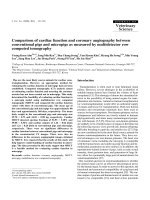
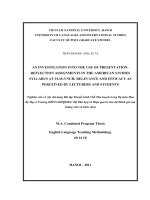
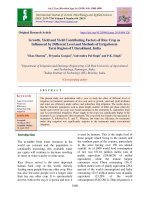

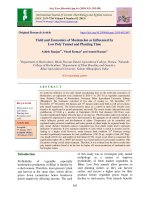
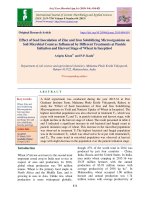
![Growth and yield of Ashwagandha [Withania somnifera (L.)] as influenced by different intercropping system in Kymore plateau of Madhya Pradesh](https://media.store123doc.com/images/document/2020_01/09/medium_vsb1578562778.jpg)

